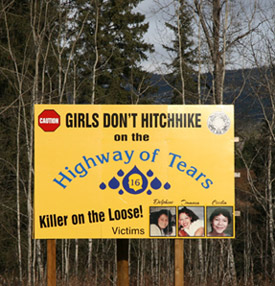COMMENT: Canada’s disappeared women
This fall British Columbia’s Missing Women Commission will finally begin its work. It does so in under a cloud of suspicion: an inadequate mandate, a potentially compromised commissioner, and a refusal to financially support affected native communities, families, and Vancouver Downtown Eastside community groups to participate and prepare submissions.
BC’s Missing Women Commission will also draw attention to the broader national shame that 582 aboriginal women have gone missing, many of whom are presumed to have been murdered, in the last generation.
The Damage Control Commission
In 2010 the provincial Liberal government, after years of trying to avoid accountability for inadequate police investigations and prosecutor neglect, established an inquiry to look into the failure to catch Robert Pickton, potentially Canada’s worst serial murderer. In 2002 Pickton was declared guilty of six second degree murders of women. It is alleged that Pickton, or other unknown parties, murdered over 60 women at the Pickton pig farm in Coquitlam. The majority of these victims were aboriginal women engaged in prostitution.
When the Commission was struck, former well-known judge and Liberal Attorney General Wally Oppal was appointed as the Commissioner. Oppal had publically recommended against an inquiry. As well, the BC Criminal Justice Branch crafted an extremely narrow mandate: to only examine police and prosecutorial failures from 1997-2002 during the Pickton investigation.
However, Oppal, in spite of his loyalty to former premier Gordon Campbell, dared to call for 1.5 million dollars to support victim participation (by families and affected groups), which has been refused by the new premier, Christy Clark. Instead, two independent lawyers have been hired to represent all victims; a government official perversely announced that funds for these lawyers had been found as a result of savings from early completion of preliminary investigations.
Oppal has also broadened the Commission’s mandate by holding five unauthorized community hearings this September, from Prince Rupert to Hazelton in Northern British Columbia along Highway 16, ‘the Highway of Tears’, where at least 18 women (and possibly 43) have gone missing.
For these transgressions, police and prosecutors have called for Oppal to recuse himself as biased against them.
At this point, victim disgust with this insincere and inadequate inquiry has led a majority of victims’ families, community and native groups to declare a boycott. When the Commission opens on October 11 in Vancouver, it is difficult to say what credibility this effort will have to honestly examine a pattern of police and justice discrimination through neglect of impoverished aboriginal women.
The bigger issue: Aboriginal Oppression
BC’s Missing Women Commission is part of a larger national shame. After the federal police, the RCMP, refused to collect aboriginal identity information on missing women victims, the Native Women’s’ Association of Canada (NWAC) began the Sisters in Spirit Initiative in 2005 to document the murderous hatred some men have wrought on aboriginal women – which the Pickton trial exposed to a national audience.
To this point in 2011, the Sisters in Spirit project has documented 582 missing aboriginal women. Researchers suspect the real number is much higher.
NWAC has presented the federal Conservative government with a set of recommendations to address the immediate and structural roots of this terrible problem.
In particular, NWAC demands:
- Training for police and justice officials about aboriginal women’s issues so that access to justice is possible;
- Collection of information – and dissemination of that information – to aboriginal families, communities, and support services for preventive purposes – which has not been done by the RCMP special investigations in Northern Alberta (Project Kane) nor in Northern BC (Project E-Pana);
- Stable funding to front line organizations that provide critical support services – in an appropriate cultural setting – for aboriginal women whether on reserves, in transit, or in cities like Vancouver;
- Investment in aboriginal child services; and
- addressing the root cause of aboriginal poverty that leads aboriginal women into high risk environments where violence is so possible.
In response, the federal government committed 10 million dollars in 2010 for a five year period to address violence against aboriginal women. In fact the majority of this money is going to police forces to work on all missing persons cases. In the case of NWAC, the Conservatives also held back the grant for Sisters in Spirit. Behind these disturbing facts, lies the Tory cancellation of the 2005 Kelowna Accord that would have invested one billion dollars in native communities to address their poverty.
State resistance, of police and prosecutors to being accountable to the public – despite the 1990s Oppal Police Commission report recommendations; an unwillingness to address the subject of prostitution; and the refusal to allow a meaningful dialogue with the victims, does not bode well in addressing an ongoing crime in Canada’s long history of aboriginal oppression.
This article is an editorial originally published in Socialist Solidarity.






















